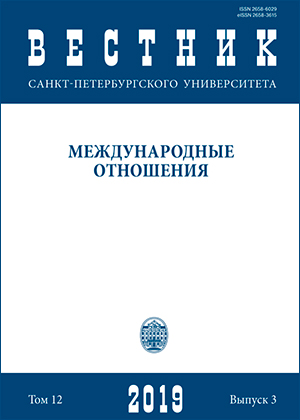Community Beyond Hegemony? Liberal Cosmopolitanism, Generic Emancipation and the Political
DOI:
https://doi.org/10.21638/11701/spbu06.2019.306Аннотация
This article critically re-evaluates certain blind spots in the debate on the possibility of a cosmopolitan political community. It does so by addressing certain key areas where, in my view, remaining conceptual misunderstandings prevent a full articulation of the conflicting positions. In particular, I concentrate on the ontological differences between liberalism and poststructuralism which, as long as they are not laid plain, distort the exchange of ideas on the nature of the political and on the issues of identity, recognition and exclusion. I contend that in poststructuralist ontology antagonism remains the only force that can constitute an inside-outside boundary and thus establish an identity. Hence, one needs to agree with Sergei Prozorov when he insists that cosmopolitan politics can only be post-identitarian. I then analyse the differences between the two visions of generic post-identitarian politics identified by Prozorov - those of Alain Badiou and Giorgio Agamben. This analysis helps to highlight the thesis that even if we can conceive of a truly generic community that is not grounded in any identity and therefore does not presuppose external othering as a constitutive practice, we might still need antagonistic politics as the only means to make this community possible.
Ключевые слова:
cosmopolitanism, antagonism, identity, othering, hegemony
Скачивания
Библиографические ссылки
Wendt, A. (2003), Why a World State Is Inevitable, European Journal of International Relations, vol. 9, no. 4, pp. 491–542.
Schmitt, C. (1996), The Concept of the Political, University of Chicago Press, Chicago and London, 162 p.
Prozorov, S. (2009), Generic Universalism in World Politics, International Theory, 2009, vol. 1, no. 2, pp. 215–247.
Bull, H. (1977), The Anarchical Society. A Study of Order in World Politics, Columbia University Press, New York, xv+335 p.
Campbell, D. (1998), Writing Security: United States Foreign Policy and the Politics of Identity, University of Minnesota Press, Minneapolis, 289 p.
Mouffe, C. (2005), On the Political, Routledge, London and New York, 144 p.
Abizadeh, A. (2005), Does Collective Identity Presuppose an Other? On the Alleged Incoherence of Global Solidarity, American Political Science Review, vol. 99, no. 1, pp. 45–60.
Arditi, B. (2007), Post-Hegemony: Politics Outside the Usual Post-Marxist Paradigm, Contemporary Politics, vol. 13, no. 3, pp. 205–226.
Rovane, C. (1997), The Bounds of Agency: An Essay in Revisionary Metaphysics, Princeton University Press, Princeton, 272 p.
Mouffe, C. (2000), The Democratic Paradox, Verso, London, 192 p.
Vaughan-Williams, N. (2009), The Generalised Bio-Political Border? Re-Conceptualising the Limits of Sovereign Power, Review of International Studies, vol. 35, no. 4, pp. 729–749.
Walker, R.B.J. (1993), Inside/Outside: International Relations as Political Theory, Cambridge University Press, Cambridge and New York, xii+233 p.
Walker, R.B.J. (2010), After the Globe, Before the World, Routledge, London and New York, 369 p.
Richter, H. (2019), Beyond the ‘other’ as constitutive outside: The politics of immunity in Roberto Esposito and Niklas Luhmann, European Journal of Political Theory, vol. 18, no. 2, pp. 216–237.
Laclau, E., Mouffe C. (1985), Hegemony and Socialist Strategy, Verso, London, 197 p.
Badiou, A. (2005), Being and Event, Continuum, London and New York, 526 p.
Laclau, E. (1996), Emancipation(s), Verso, London, 124 p.
Müller, K.B. (2018), Active Borders and Transnationalization of the Public Sphere in Europe: Examining Territorial and Symbolic Borders as a Source of Democratic Integration, Positive Identity, and Civic Learning, Alternatives, vol. 43, no. 3, pp. 119–136.
Errejón, I. and Mouffe, C. (2016), Podemos: In the Name of the People, Lawrence & Wishart, London, 160 p.
Staten, H. (1984), Wittgenstein and Derrida, University of Nebraska Press, Lincoln and London, 184 p.
Wæver, O. (1998), Insecurity, Security and Asecurity in the West European Non-war Community, in Adler, E., Barnett, M. (eds), Security Communities, Cambridge University Press, Cambridge, pp. 69–118.
Diez, T. (2004), Europe’s Others and the Return of Geopolitics, Cambridge Review of International Affairs, vol. 17, no. 2, pp. 319–335.
Joenniemi, P. (2007), Towards a European Union of Post-Security? Cooperation and Conflict, vol. 42, no. 1, pp. 127–148.
Prozorov, S. (2011), The Other As Past and Present: Beyond the Logic of ‘Temporal Othering’ in IR Theory, Review of International Studies, vol. 37, no. 3, pp. 1273–1293.
Rumelili, B. (2008), Interstate Community-Building and the Identity / Difference Predicament, in Price, R. (ed.), Moral Limit and Possibility in World Politics, Cambridge University Press, Cambridge, pp. 253–280.
Mouffe, C. (2009), Democracy in a Multipolar World, Millennium, vol. 37, no. 3, pp. 549–561.
Laclau, E. (2005), On the Populist Reason, Verso, London, 276 p.
Prozorov, S. (2009), Giorgio Agamben and the End of History: Inoperative Praxis and the Interruption of the Dialectic, European Journal of Social Theory, vol. 12, no. 4, pp. 523–542.
Badiou, A. (2006), Theoretical Writings, Continuum, London and New York, 292 p.
Interview with Alain Badiou (2006), Carceraglio, 16 October, available at: http://scentedgardensfortheblind.blogspot.com/2006_10_15_scentedgardensfortheblind_archive.html (accessed: 26.01.2019).
Wright, C. (2008), Event or Exception? Disentangling Badiou from Schmitt, or, Towards a Politics of the Void, Theory and Event, vol. 11, no. 2, available at: https://muse.jhu.edu/article/240327 (accessed: 26.01.2019).
Prozorov, S. (2014), Ontology and World Politics, Routledge, London and New York, 132 p.
Agamben, G. (2005), The Coming Community, University of Minnesota Press, Minneapolis and London.
Agamben, G. (2000), Means Without End: Notes on Politics, University of Minnesota Press, Minneapolis, 168 p.
Badiou, A. (2009), Logics of Worlds, Continuum, London and New York, 640 p.
Agamben, G. (1998), Homo Sacer: Sovereign Power and Bare Life, Stanford University Press, Stanford, 228 p.
Загрузки
Опубликован
Как цитировать
Выпуск
Раздел
Лицензия
Статьи журнала «Вестник Санкт-Петербургского университета. Международные отношения» находятся в открытом доступе и распространяются в соответствии с условиями Лицензионного Договора с Санкт-Петербургским государственным университетом, который бесплатно предоставляет авторам неограниченное распространение и самостоятельное архивирование.




